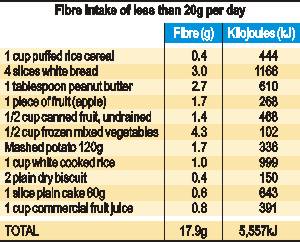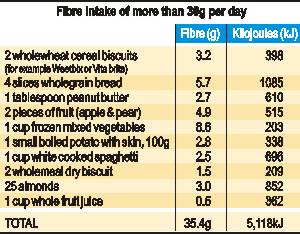|
Health
How Important is Fibre in Your Food?
Dietary fibre is found in cereals, fruits and vegetables. Fibre is a carbohydrate, made up of the indigestible parts or compounds of plants, which pass relatively unchanged through our stomach and intestines.
Fibre keeps the digestive system healthy
Dietary fibre is mainly needed to keep the digestive system healthy. It also contributes to other processes, such as stabilising glucose and cholesterol levels. In countries with traditionally high fibre diets, diseases such as bowel cancer, diabetes and coronary heart disease are much less common than in the West.
Fibre keeps the digestive tract healthy
The principle advantage of a diet high in fibre is the health of the digestive system. The digestive system is lined with muscles that massage food along the tract from the moment a mouthful is swallowed until the eventual waste is passed out of the bowel (a process called peristalsis). Since fibre is relatively indigestible, it adds bulk to the faeces.
Soluble fibre soaks up water like a sponge, which helps to plump out the faeces and allows it to pass through the gut more easily. It acts to slow down the rate of digestion. This slowing down effect is usually overridden by insoluble fibre, which doesn't absorb water and speeds up the time that food passes through the gut.
You must drink lots of fluid
A high fibre diet may not prevent or cure constipation unless you drink enough water every day. Some high fibre breakfast cereals may have around 10g of fibre per serve and if this cereal is not accompanied by enough fluid it may cause constipation.
Fibre and ageing
Fibre is even more important for older people. The digestive system slows down with age, so a high fibre diet becomes even more important.
Lowering blood cholesterol
Recently, there has been a great deal of interest in oat bran, since some studies showed that regular intake of foods high in soluble fibre -- such as oat bran, baked beans and soybeans - reduced blood cholesterol levels. When blood cholesterol levels are high, fatty streaks and plaques are deposited along the walls of arteries. This can make them dangerously narrow and lead to an increased risk of coronary heart disease.
It is thought that soluble fibre lowers blood cholesterol by binding bile acids (which are made from cholesterol to digest dietary fats) and then excreting them. Cereal fibre seems to be more protective against coronary heart disease than the fibre from fruit and vegetables.
 A method of weight control A method of weight control
In many cases, people who are overweight or obese have been shown to lose significant amounts of excess body fat simply by increasing the amount of dietary fibre, especially soluble fibre, in their daily diet.
Fibrous foods are often bulky and, therefore, filling. They also tend to be low in fat. Soluble fibre forms a gel that slows down the emptying of the stomach and the transit time of food through the digestive system. This extends the time a person feels satisfied or 'full'. It also delays the absorption of sugars from the intestines. This helps to maintain lower blood sugar levels and prevent a rapid rise in blood insulin levels, which has been linked with obesity and an increased risk of diabetes.
The extra chewing time often required of high fibre foods also helps contribute to feeling satisfied. As a result, a person on a high fibre diet is likely to eat less food and so consume less kilojoules (calories).
Good for people with diabetes
For people with diabetes, eating a diet high in fibre slows glucose absorption from the small intestine into the blood. This reduces the possibility of a surge of insulin, the hormone produced by the pancreas to stabilise blood glucose levels.
Conditions linked to low fibre diets
Eating a diet low in fibre can contribute to many disorders, including:
*Constipation - small, hard and dry faecal matter that is difficult to pass.
*Haemorrhoids - varicose veins of the anus.
*Diverticulitis - small hernias of the digestive tract caused by long term constipation.
*Irritable bowel syndrome - pain, flatulence and bloating of the abdomen.
*Overweight and obesity - carrying too much body fat.
*Coronary heart disease - a narrowing of the arteries due to fatty deposits.
*Diabetes - a condition characterised by too much glucose in the blood.
*Colon cancer - cancer of the large intestine.
Ways to increase your fibre intake
Simple suggestions for increasing your daily fibre intake include:
*Eat breakfast cereals that contain barley, wheat or oats.
*Switch to wholemeal or multigrain breads and brown rice.
*Add an extra vegetable to every evening meal.
*Snack on fruit, dried fruit, nuts or wholemeal crackers.
A daily intake of more than 30g can be easily achieved if you eat wholegrain cereal products, more fruit, vegetables and legumes and, instead of low fibre cakes and biscuits, have nuts or seeds as a snack or use in meals.
You don't need to eat a lot more kilojoules to increase your fibre intake; you can easily double your fibre intake without increasing your kilojoule intake by being more selective - compare the tables below.
 A sudden increase in fibre can have explosive effects A sudden increase in fibre can have explosive effects
It should be noted that a sudden switch from a low fibre diet to a high fibre diet can create some abdominal pain and increased flatulence. Also, very high fibre diets (more than 40g daily) are linked with decreased absorption of some important minerals, such as iron, zinc and calcium. This occurs when fibre binds these minerals and forms insoluble salts, which are then excreted.
This could increase the risk of developing deficiencies of these minerals in susceptible individuals. Adults should aim for a diet that contains 30-35g of fibre per day and should introduce fibre into the diet gradually to avoid any negative outcomes.
It is better to add fibre to the diet from food sources rather than from fibre supplements as these can aggravate constipation, especially if you don't increase the amount of water you drink daily.
Where to get help
*Your doctor
*Dietician.
Things to remember
*Dietary fibre is found in the indigestible parts of cereals, fruits and vegetables.
*A diet high in fibre keeps the digestive system healthy.
Source: Better Health Channel (Online)
Copyright
(R) thedailystar.net 2005 |
